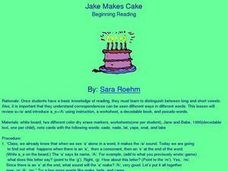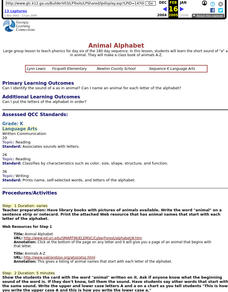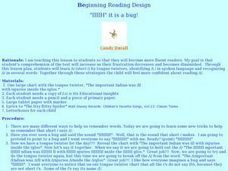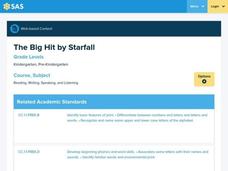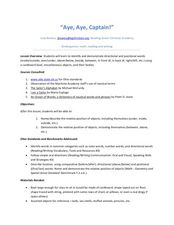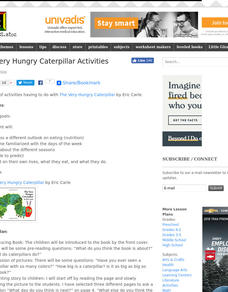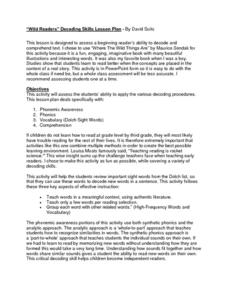Curated OER
O No!
First graders distinguish between short vowel a and long vowel O. They are introduced to the vowel-consonant-e pattern that changes short vowel sounds into long vowel sounds. They practice spelling words with the vowel-consonant-e pattern.
Curated OER
Vowels: review of short and long e, o
First graders investigate sounds of short and long vowels for e and o. They develop phonics skills through drill and practice sessions. They use a variety of activities that include games. This is a whole unit plan.
Curated OER
I Scream for Ice Cream!
Students determine that correspondences appear differently in different words. They discover the difference between long and short vowels and that these correspondences are spelled and pronounced differently. They review the i=/i/ and ...
Curated OER
Jake Makes Cake
Students distinguish between short vowel a and long vowel a. They are introduced to the vowel-consonant-e pattern that changes short vowel sounds into long vowel sounds. They practice changing words to long vowel sounds by adding an...
Curated OER
Make a Word: Long U by Starfall
Students explore language arts by participating an on-line grammar activity. In this letter U lesson, students discuss the uses for the letter U in the English language and the different sounds that can be made from the vowel. Students...
Curated OER
Animal Alphabet
Students make a class animal book using the letters of the alphabet. They use a website imbedded in this plan to get pages with animals that begin with any of the 26 letters.
Curated OER
Juggling Bugs
Students examine the letter 'u'. Through instruction and modeling they explore the sound the letter makes, how the letter is written, words that contain the letter, etc. They say tongue twisters with the /u/ sound in them. They listen to...
Curated OER
"IIIIH" it is a bug!
Students practice the long and short vowel sounds of /i/ in a variety of text with assessing different strategies. They utilize tongue twisters to assist them including "The Itsy Bitsy Spider" and "Liz is Six." Letterboxes are also...
Curated OER
The Itsy Bitsy Pig
First graders recognize the short vowel I in written and spoken language. Through matching activities, they discriminate the short vowel /i/ from other vowel sounds. Students associate the phoneme with its letter representation and...
Curated OER
"Aaaaaa!!!!" Please Don't Cry Baby!
Students complete a variety of activities as they examine the letter 'a' as it makes the short /a/ sound. Through instruction and modeling, they explore the sound the letter makes and how the letter is written. They recite tongue...
Curated OER
Dad's Fat Hat
Students complete a variety of activities as they examine the letter 'a' as it makes the short /a/ sound. Through instruction and modeling, they explore the sound the letter makes and how the letter is written. They recite tongue...
Curated OER
Letter Hunt
Students search for and find certain letters, blends, or vowel combinations in words, sentences and paragraphs. They investigate how these letters, blends or combinations are used in "every day" writing.
Alabama Learning Exchange
Phonics lesson for -ew and -oo
First graders identify letters and sounds associated with -ew and -oo sounds. Each learner receives a stack of cards containing these sounds, and they must determine whether the word uses the -ew or the -oo sound. This could easily...
Curated OER
The Big Hit
Students are introduced to the phonetic sound associated with the short letter "i" and listen to a story which includes words with this sound. For this the big hit starfall lesson, students build sound letter accuracy. Students also...
Curated OER
Voicing and Syllable Length (Using Rubber Bands)
Students identify voiced and unvoiced sounds. They practice using short and long vowel sounds. They identify consonants only after paying attention to the length of vowels. They use rubber bands to help them determine the difference...
Curated OER
Iggy and the Icky Sticky Inchworm
Students read and spell words. They have to recognize that letters stand for phonemes and spellings map out spoken words. Long and short vowels are hard to recognize and this lesson focuses on that. The short i is taught in the...
Curated OER
Aye, Aye Captain
Learners investigate how correspondences appear differently in different words. They also recognize the difference between long and short vowels. Students study how these correspondences are spelled and pronounced differently.
Curated OER
Fluency is Freedom!
Students read orally in groups of two to increase reading speed and fluency in this lesson. They read provided books which emphasize the short vowel sounds. The pairs time each others reading and offer encouragement and support as they...
Alabama Learning Exchange
Phonics lesson for -ick family
Kindergarteners and first graders develop phonemic awareness for words that contain -ick. Each learner gets a stack of cards with different -ick words, highlighting the target sound as they review each one.
Curated OER
Spinning Short Vowel Game
First graders, in pairs, use spinners to experiment with different combinations of letters. They combine letters and determine whether they have produced a word or not. They construct and record words choosing letters from designated tiles.
Curated OER
Double Jeopardy-Homophones
Second graders identify homophones as words that sound alike but have different meanings. They, given a pair of homophones, are to explain the meanings of the words using gestures, role playing, or drawing a picture with their partner.
Curated OER
The Very Hungry Caterpillar
Students participate in activities associated with the book, "The Very Hungry Caterpillar". They practice using new vocabulary and the days of the week. They create a book about what they ate on the different days of the week and how the...
Curated OER
First Day of School
Primary learners complete pre reading, writing, during reading, and interdisciplinary activities for the book First Day of School. They will complete journal entries, answer short answer questions, have discussions, and much more.
David Suits
“Wild Readers” Decoding Skills Lesson Plan
Set young readers on the path toward fluency with this phonemic awareness resource. Based on the award-winning children's book, Where the Wild Things Are, this lesson allows beginning readers to practice isolating phonemes and...





